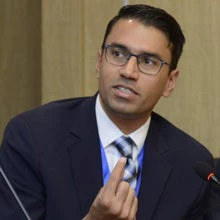
We walked into the largish conference room in the Baghdati municipality building. This small town of about five thousand people is in western Georgia, in the Caucasus. It was freezing cold, and the recent snowfall had deposited a crisp, beautiful white sheet all around. Not too different from my thoughts at the time; a blank sheet, waiting to hear from a collection of small businesses.
The topic: if and how these businesses use the internet.
As part of our team were two staff from Georgia’s innovation and technology agency (GITA), four World Bank staff and consultants, and our interpreter. This focus group was part of our constant citizen engagement effort as part of the Georgia National Innovation Ecosystem (GENIE) Project – a US$40 million IBRD lending program, with support from the World Bank Umbrella Trust Fund for Jobs.
Waiting for us were about 30 people, a mix of younger and older residents of the town and its immediate surroundings. There were serious-looking older men and women, a smattering of younger people, and – what struck me instantly as we walked in – two young Orthodox priests sitting at the far end of the room.
Bread, honey, and hairstyles
After a brief introduction on our project and the objective of the meeting, we asked everyone to take turns and say a bit about their businesses and if and how they used the internet. I was both surprised and informed.
Even the smallest of these businesses – and keep in mind, this is a small town in a relatively small country – were using the internet, and in interesting ways that would find resonance in any advanced digital economy. Bakeries and farmers were using online accounting services, and managing tenders and invoices online. Local wine makers, a vegetable farmer, and a nut grower accessed information and customers, and were now thinking about how they might advertise and sell their products online, including through social media service Facebook. A hairdresser would look for new styles online, and a cattle farmer – with 60 animals and three employees – would find information on medicines and vaccines for his animals.
A fishery operator made a powerful declaration when he told us that “being without internet is like being disconnected from electricity.” And the two priests? They were there as representatives of a beekeeping cooperative; they were too small to sell their honey online (they felt demand would be too high) but used the internet to find information on keeping their bees healthy.
But there were also some businesses that were not online. In some cases, they had the internet at home or on their smart phones, but did not use it for business purposes. In other cases, especially for businesses that were in the nearby mountainous areas, access was an issue. Put another way, there was demand, but not always supply of connectivity. Another problem related to supply was that the quality of Internet services was often poor or unpredictable; businesses complained that advertised speeds were rarely met and repairs when needed were slow to happen. If they could not rely on the Internet entirely, they would not be able to use it meaningfully for their business.
A lot covered, but much left to do
Georgia is well served by the internet. Internet subscriptions are at about 55 percent of the population (as of late 2016). The Government has invested a lot in building powerful e-government services, for citizens and businesses, and the effects are evident. Many of these small businesses use those services for their taxes and tenders, for instance. Now, the Government plans to build a national fiber optic network that will push high capacity networks deeper into rural areas.
But it is clear that quality of service is an issue. And many of these subscriptions are via smartphones where functionality and services needed for business or employment might be limited – have you ever tried filling in a job application or tax return on a smartphone? Moreover, many rural communities lag in internet use, as do the poor or people living in remote areas.
What does this all mean for us? The GENIE Project will be supporting a US$9 million ‘demand facilitation’ program – the Broadband for Development program to connect about 30,000 households and 3,000 small businesses in rural areas to high-speed internet. The World Bank’s policy dialogue focuses on the supply-side, supporting reforms that draw private investment into network expansion.
I hope that GENIE will help get more small and household enterprises online. There seems to be broad awareness that the internet can help them connect to new markets and innovate. Programs that build awareness on the benefits of upgrading a business’ online activity will pay off; additional training for businesses that take the ‘next step’ will then accelerate their growth and create good jobs. Hence, we need to test out and evaluate a mix of interventions: training on becoming a digital business that uses IT in production and marketing; a voucher to connect to high-speed Internet; and a small subsidy to purchase new IT equipment. We are working with the Government on one of the world’s first randomized control trials to understand how different combinations of these interventions pay off in terms of business growth and job creation.
I expect that more of rural Georgia’s small businesses will go digital, and that they will be better off for it. They will grow, create jobs, and become more innovative and productive. Expanding the benefits of being online to some of the poorest and remotest parts of the country, will also make for an exciting experience for other countries to consider in their own digital journeys.
Follow the World Bank Jobs Group on Twitter @wbg_jobs.


Join the Conversation